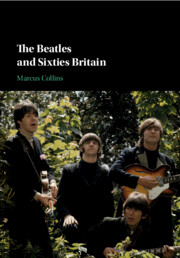Book contents
- The Beatles and Sixties Britain
- The Beatles and Sixties Britain
- Copyright page
- Contents
- Figures
- Tables
- Preface: Imagining the Beatles
- Introduction
- 1 The Other Sixties: An Anti-Permissive Permissive Society?
- 2 Society, 1963–1965: The Beatles and Modernity
- 3 Society, 1966–1970: The Beatles Go Too Far
- 4 Culture: The Beatles as Artists
- 5 Politics: The Beatles, Parliament and Revolution
- Conclusion
- Notes
- Bibliography
- Index
2 - Society, 1963–1965: The Beatles and Modernity
Published online by Cambridge University Press: 11 March 2020
- The Beatles and Sixties Britain
- The Beatles and Sixties Britain
- Copyright page
- Contents
- Figures
- Tables
- Preface: Imagining the Beatles
- Introduction
- 1 The Other Sixties: An Anti-Permissive Permissive Society?
- 2 Society, 1963–1965: The Beatles and Modernity
- 3 Society, 1966–1970: The Beatles Go Too Far
- 4 Culture: The Beatles as Artists
- 5 Politics: The Beatles, Parliament and Revolution
- Conclusion
- Notes
- Bibliography
- Index
Summary
Transformation was the leitmotif of coverage of the Beatles from 1963 to 1965. The band and their fans served as symbols of modernity who tested established institutions’ capacity for change. Scrutiny of institutions broadened out into questions of identity. Attitudes towards class and religion, gender and generation, region and nation, morality and sexuality were articulated and debated in reaction to the Beatles. Their transformative powers, whether actual or potential, led contemporaries to contemplate the possibility and desirability of social, cultural and political change in 1960s Britain. The Beatles did not carry all before them during this period, however. Beatlemania incited Beatlephobia and contemporary commentary revealed sixties Britain to be decidedly less permissive and more averse to change than its most famous sons. The Beatles nonetheless had a significant impact on discussions of social issues, both directly through their art and interviews and indirectly by generating discourses about them and what they represented. Mass culture, Americanisation, secularisation, meritocracy, female sexuality, the ‘youth question’, the ‘generation gap’ and the North-South divide looked different in light of the Beatles’ stardom.
Keywords
- Type
- Chapter
- Information
- The Beatles and Sixties Britain , pp. 48 - 75Publisher: Cambridge University PressPrint publication year: 2020

